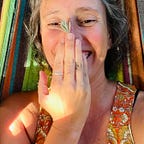The Hunger
US journalist Dahr Jamail recalls the “disease of exploitation” in the preface to Carolyn Baker’s book Undaunted: Living Fiercely into Climate Meltdown in an Authoritarian World. Also called cannibal pathology or wétiko (a term used by Native American groups — wétiko for the Algonquin, windigo for the Ojibwa). This term was re-titled more than thirty years ago by Native American professor Jack D. Forbes in his book Columbus and Other Cannibals. Cannibalism, as Forbes defined it, “is the consuming of another’s life for one’s own private end or profit.”
He goes on to entwine this expression with contemporary capitalist culture: “imperialism and exploitation are forms of cannibalism, and indeed it is precisely those forms of cannibalism that are most diabolical or evil.”
Jamail refers that according to the perspectives of native peoples around the world, few, if any, societies on the face of the earth have been as greedy, cruel, violent, and aggressive as some European populations.
Jamail writes about a Chiricahua Apache elder reporting that: “The white man slaughtered, over a short period, 50 million buffalo, because thousands of us trusted them, and in less than a generation, they annihilated them. And they are proud of it, and they photograph the dead buffalo, as if it would take a real man to shoot an animal with an energy-powered rifle from afar.”
This is just one fractal point in a narrative that repeats and repeats itself, untangling the precious knots in the complex ecosystem network that sustains us all. We talk about buffaloes, passenger pigeons, mountain goats, bears, zebros, yews, chestnut trees, or oaks.
We speak of Hunger turned into greed, emptiness, and fear. We speak of the acts of violence perpetrated by destruction technologies (some would say “defense” or “progress”). We take the courage to assume that our innocent comfort comes from greed, cruelty, violence, and aggression. From the fear of scarcity that makes us take everything. So does our blindness of the soul.
On the other hand, Jorge Paiva, in his presentation “The relevance of phitodiversity in Montemuro”, reminds us of how these great technological achievements, such as “the portuguese discoveries” (in fact, the great invasions and genocide), had a huge cost in our territory. The author states that “the Discoveries were the greatest misfortune for the forests of mainland Portugal, as each ship needed wood from 2000–4000 oak trees”, and goes on to say that “during that time more than 5 million oak trees were felled. This is how much of the country was deforested, and many of our very rich oak forests, full of Biodiversity, disappeared.” The reduction of Biodiversity continued for centuries with the planting of pine and eucalyptus monocultures (fast-growing to feed the human economy while weakening the web of Life).
And with this, the near extinction of the rich native species forests that held the wisdom of fire, making the small existing areas fragile and unprotectable.
Let us now recall Forbes’ definition of cannibalism, wékito: “the consuming of another’s life for one’s own private end or profit.” We are still talking about Hunger turned greed. Of the misunderstanding of what a healthy and diverse ecosystem really is, the inability to distinguish a monoculture from an ancient, living, vibrant forest. Of taking too much and giving too little. The illusion of superiority. We also stopped listening to the wisdom of fire, its stories, and teachings.
So here we are, in 2022, in the days when the Zêzere Glacier Valley, a Unesco World Heritage site, continues to burn.
It is thirteen kilometers long of a native and ancient forest, almost entirely in ashes. A small bubble of hundreds and hundreds of years of unique, precious, rich Biodiversity. An echo of a past of leafy forests full of interspecies relationships. You can’t replant if you haven’t cared for.
These fires are also the result of generations of dissociation and decades of bad “land management” policies, from lousy water governance to fast-growing monocultures that erode the complex fabric of Life and ecosystems.
You don’t rebuild an ecosystem of this ancestry and complexity, and you don’t replant its value. Time here is no longer our ally. We have lost it. From Hunger made greed, we now breathe ash. We stifle grief and find business opportunities because we have forgotten the real value of Life: “The consuming of another’s life for one’s own private end or profit.” We consume ourselves.
The traditional Portuguese saying goes unheard: He who wants all, loses all.
References:
Montemuro — The Last Route of Transhumance, Article by — January 1999
https://www.researchgate.net/publication/256375116
The relevance of phytodiversity in Montemuro — by Jorge Paiva
Undaunted: Living Fiercely into Climate Meltdown in an Authoritarian World, Baker, Carolyn
©Sofia Batalha 2022
